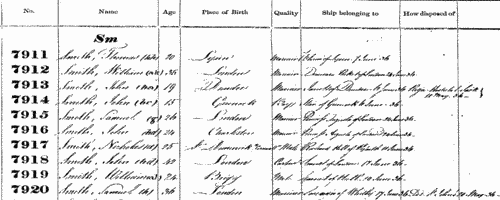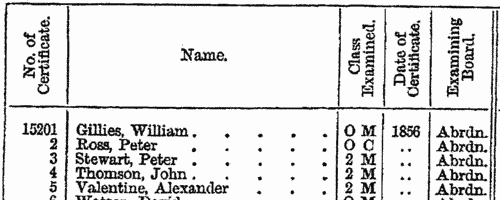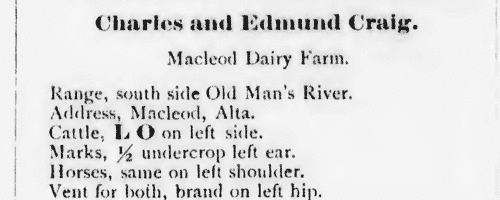Clink Surname Ancestry ResultsOur indexes 1800-1900 include entries for the spelling 'clink'. In the period you have requested, we have the following 5 records (displaying 1 to 5): Buy all | | | Get all 5 records to view, to save and print for £32.00 |
These sample scans are from the original record. You will get scans of the full pages or articles where the surname you searched for has been found. Your web browser may prevent the sample windows from opening; in this case please change your browser settings to allow pop-up windows from this site.  British merchant seamen
(1835-1836) British merchant seamen
(1835-1836)
At this period, the foreign trade of ships plying to and from the British isles involved about 150,000 men on 15,000 ships; and the coasting trade about a quarter as many more. A large proportion of the seamen on these ships were British subjects, and so liable to be pressed for service in the Royal Navy; but there was no general register by which to identify them, so in 1835 parliament passed a Merchant Seamen's Registration Bill. Under this act this large register of British seamen was compiled, based on ships' crew lists gathered in British and Irish ports, and passed up to the registry in London. Each seaman was assigned a number, and the names were arranged in the register by first two letters of the surname (our sample scan shows one of the pages for 'Sm'); in addition, an attempt was made to separate out namesakes by giving the first instance of a name (a), the second (b), and so on. But no effective method was devised to prevent the same man being registered twice as he appeared in a second crew list; moreover, the original crew lists were clearly difficult for the registry clerks to copy, and some of the surname spellings appear to be corrupted. A parliamentary committee decided that the system devised did not answer the original problem, and this register was abandoned after less than two years: but it is an apparently comprehensive source for British merchant seamen in 1835 to 1836. The register records the number assigned to each man; his name; age; birthplace; quality (master, captain, mate, 2nd mate, mariner, seaman, fisherman, cook, carpenter, boy &c.); and the name and home port of his ship, with the date of the crew list (usually at the end of a voyage). Most of the men recorded were born in the British Isles, but not all (for instance, Charleston and Stockholm appear in the sample scan). The final column 'How disposed of' is rarely used, and indicates those instances where a man died, was discharged, or deserted his ship during the voyage.CLINK. Cost: £8.00.  | Sample scan, click to enlarge

| Inhabitants of New South Wales (1836)
The Convicts' Office of New South Wales issued these lists of inhabitants to whom male convicts had been assigned to work as servants or farm workers. The list gives each inhabitant's surname, christian name (or rank), address, and number of convicts and for what work. February 1836.
CLINK. Cost: £6.00.  | Sample scan, click to enlarge

| Masters and Mates of Merchantmen: Certificates of Competency
(1857)
The Mercantile Navy List and Annual Appendage to the Commercial Code of Signals for All Nations, edited by J. H. Brown, was published By Authority in 1857. It includes this full list of 'Masters and Mates who have passed their examination and obtained Certificates of Competency', from number 1 to number 15816, except for those whose certificates had been cancelled. The first column gives the number of certificate; the second column full name, surname first (an asterisk before the name denotes those who are found qualified to act in fore and aft-rigged vessels only; two vertical lines denotes in North Wales fishery only; a double dagger, passed the examination in steam; and a dagger refers to honorary testimonials, details of which are printed at the end of the section. A B C D are the distinguishing letters for the four classes of Meteorological Observers); third column, class examined (1 ex, 1, 2 and 3 denote First Extra, First, Second and Third Class Master's Certificate, granted under the Voluntary Examination, by Order in Council dated August 1845; Ex C, Master Extra; O C, Master Ordinary; 1 M, First Mate; O M, Only Mate; 2 M, Second Mate; L. R. N., Lieutenant Royal Navy; M. R. N., Master Royal Navy; E. I. C., East India Company; M. I. N., Master Indian Navy.); fourth column, year of certificate (where there are two dots, this is to represent a 'ditto' to the year next above); fifth column, Examining Board (Aberdeen, Belfast, Bristol, Cork, Dublin, Dundee, Glasgow, Greenock, Hull, Leith, Liverpool, London, Newcastle, Plymouth, Shields or Sunderland).CLINK. Cost: £4.00.  | Sample scan, click to enlarge

| Alberta Ranchers (1888)
Henderson's Northwest Ranchers' Directory gives names and addresses of ranchers in Alberta and Assiniboia, with brands and marks for their horses and cattle
CLINK. Cost: £8.00.  | Sample scan, click to enlarge

| Owners of Merchantmen Lost at Sea by Stranding
(1897-1898)
Abstracts of the returns made to the Board of Trade of shipping casualties which occurred on or near the coasts or in rivers and harbours of the United Kingdom; and to British vessels elsewhere; and to foreign vessels on or near the coasts or in the rivers and harbours of British possessions abroad (including the Great Lakes of North America). The tables are arranged into the broad divisions of Total Losses at Sea (founderings, strandings, collisions, other causes, and missing); Partial Losses at Sea (founderings, strandings, collisions and other causes); Total Losses in Rivers, Lakes and Harbours (founderings, strandings, collisions and other causes); and Partial Losses in Rivers, Lakes and Harbours (founderings, strandings, collisions and other causes). In each case they state (so far as known) the date; name and age of the vessel; port of registry (if British); class in Lloyd's Register, Liverpool Book or Bureau Veritas; description of vessel, and whether iron (I.) or wood (W.); tons; number of crew; name of master (usually surname and initials); name and address of owner(s); port sailed from; port bound to; cargo and number of passengers (if any); number of lives lost; wind (direction and strength); and place of casualty. July 1897 to June 1898
CLINK. Cost: £6.00.  | Sample scan, click to enlarge

|
Research your ancestry, family history, genealogy and one-name study by direct access to original records and archives indexed by surname.
|








